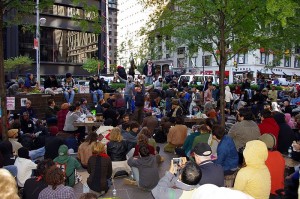Phoenix
I like my anger. I stoke it
like a fire, tend to it
with tender hands, cup
a hand ’round as I
blow to fan the flames
IN 1974, TWO teenagers went on a vandalism spree in the quiet community of Elmira, Ontario. They slashed car tires, broke store windows, and destroyed a garden gazebo, racking up about $3,000 worth of damage. The pair faced jail time for malicious vandalism. Instead, their parole officer, Mark Yanzi, who was also part of Mennonite Central Committee in Canada, asked the presiding judge if the youths could meet their victims face to face. This, they said, would allow the offenders to apologize directly and pay for damages. The judge agreed—setting legal precedent in Canada.
Though Indigenous and First Nations communities have a long history of similar conflict resolution practices, the Elmira case is seen as a moment when formalized restorative justice models, known at the time as victim-offender reconciliation programs (VORP), entered the Canadian criminal legal system. And Mennonite Christians were integral from the beginning.
In a 1989 handbook, VORP Organizing: A foundation in the church, Ron Claassen, Howard Zehr, and Duane Ruth-Heffelbower further developed the concept of VORP as a program that could work in cooperation with the judicial system but embodied “different assumptions about crime and punishment.”
“True justice requires that things be made right between the one offended and the one who has done the offending. It embodies a concept of restoration—of victim as well as offender. This also implies personal accountability on the part of the offender, who is encouraged to acknowledge his or her responsibility for the harm, participate in deciding what needs to be done, and to take steps to make amends,” they wrote.
“Barack Obama didn’t divide us,” said Nathan A. Finn, dean of the School of Theology and Missions at Union University, a Southern Baptist college in Jackson, Tenn.
“Donald Trump divided us. His personal behavior, his policy views, his temperament and character, his religious values, all were highly questionable.”

Image via welcomia/Shutterstock.com
The city of Phoenix has decided to replace prayer at its public meetings with a moment of silence. The move comes after a representative from the Satanic Temple was approved to say a prayer, or invocation, before a council meeting scheduled for Feb. 17.
Passion and purpose.
Sounds familiar, huh? Those two words are at the heart of activism and social justice. I could have safely assumed that almost every young Christian activist at the Justice Conference in Philadelphia back in February was passionate about a particular purposeful cause. I’m surprised a Christian conference hasn’t already picked up on the whole passion and purpose thing for slogan or tag line.
Christian conferences aside, I never thought those two words would be the foundation of a cutting-edge music and food festival at Merriwewather Post Pavilion, and certainly not one where 18,000 people were jamming to some of their favorite artists and scurrying over to local food trucks for healthy, delicious food in between sets. Heck, I didn’t know there was such a thing as a festival that focuses on both music and food.
We've compiled a list of links where you can learn more about the genesis of the #OccupyWallStreet movement, including links to news reports, organizations involved in formenting the movement and local groups in every state where you can get involved close to home (if you don't live in Lower Manhattan.)
Two long pieces this weekend described "one hell of a killing machine," and "the dark matter




